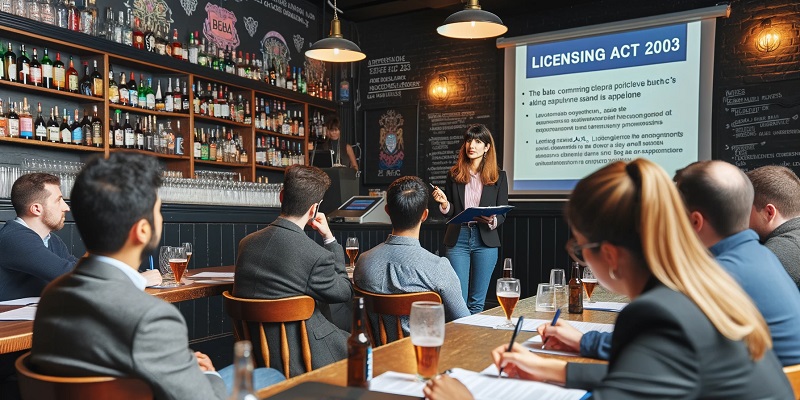🔥 Popular Free Downloads

THE FULL WORKS
All of our staff training manuals in one handy download!

FREE STAFF HANDBOOK
A totally customisable free staff handbook download.

FREE PROFIT & LOSS CALCULATOR
Keep on top of your expenses with our free profit and loss calculator.
🔥 Popular Pages
- How to Run a Restaurant
- Awesome Articles
- Managing Your Staff
- Marketing Your Restaurant
- Restaurant Financing and Funding
- Maintaining Neutrality in Pronoun Usage
- Everything You Wanted To Know About Gin
- Safe Cooking Temperatures For Meat
⭐ Popular Resources

SWOT ANALYSIS
SWOT Analysis explained in detail accompanied by a free download.

DOWNLOADS HUB
The place to download all of our free forms, templates & guides.

FREE CASH FLOW CALCULATOR
Download our free template or use our online cash flow calculator.

BAR MANAGEMENT TRAINING
Simple and free online bar and cellar management training.

Licensing Act 2003 - Your Responsibilities
Written by The Restaurant Doctor UK Team
Last Updated: 29th October 2023
<<< 18. Weights & Measures | 20. Dealing With Awkward Customers >>>
The Licensing Act 2003 is an Act of the Parliament of the United Kingdom that came into effect on 24th November 2005. This Act aims to provide a unified framework for regulating the sale and supply of alcohol, public entertainment, and late-night refreshment in England and Wales. The objective of the Act is to promote responsible sale and consumption of alcohol, prevent crime and disorder, and improve public safety.
Coverage of the Licensing Act 2003
The Licensing Act 2003 has replaced various previous legislations, such as the Licensing Act 1964, the Licensing (Scotland) Act 1976, and the Licensing (Northern Ireland) Order 1996. The Act applies to all premises in England and Wales that sell alcohol, provide public entertainment, or serve late-night refreshment.
Types of Licenses
Under the Act, anyone who wishes to sell or supply alcohol, provide public entertainment, or serve late-night refreshment must hold an appropriate license or be authorized to do so. There are several types of licenses available, such as personal licenses, premises licenses, and temporary event notices.
Requirements for License Holders
The Act sets out a range of conditions and requirements that license holders must adhere to, including the need to promote the licensing objectives. These objectives include the prevention of crime and disorder, public safety, the prevention of public nuisance, and the protection of children from harm.
Responsibilities of License Holders
License holders have a responsibility to ensure that alcohol is sold and consumed responsibly. This includes not knowingly serving anyone who is underage, drunk, or likely to become drunk. License holders must also take steps to prevent drunk driving, including not knowingly allowing anyone to drink and drive.
Penalties for Breaching the Act
The penalties for breaching the Licensing Act 2003 can be severe and include fines, imprisonment, and the revocation of licenses. Therefore, it is essential for license holders to understand their responsibilities and ensure that they comply with the Act at all times.
List of Requirements for License Holders:
- Not knowingly allowing anyone to drink and drive.
- Not knowingly serving anyone who is under 18 years old.
- Not knowingly serving anyone who appears to be drunk.
- Unless they have the relevant permission, not letting children into their premises.
Conclusion:
The Licensing Act 2003 has had a significant impact on the sale and supply of alcohol, public entertainment, and late-night refreshment in England and Wales. The Act has provided a unified framework for regulating these activities and promoting responsible sale and consumption of alcohol, public safety, and crime prevention.
License holders play a critical role in ensuring that the objectives of the Act are met, and they have several responsibilities to comply with. These responsibilities include not serving underage or intoxicated individuals, preventing drunk driving, and ensuring that children are protected from harm.
Overall, the Licensing Act 2003 has been instrumental in promoting responsible drinking and improving public safety. It is essential for license holders to understand their responsibilities and adhere to the requirements set out in the Act to avoid severe penalties and ensure compliance with the law.
You may also like...
Business Finance, Credit, Borrowing Money and Funding:
Looking to borrow money or wanting to apply for a credit card, mortgage, overdraft, business loan or even car insurance for your restaurant? This article covers the areas you need to consider when applying for finance, borrowing money and applying for credit for your business. Looking after your money is important, especially money you borrow.